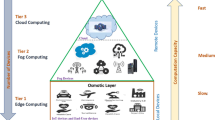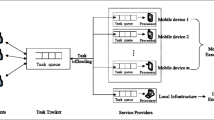Abstract
The transfer of cloud-computing capabilities at the network’s edge reduces the service latency and energy shortage problem in Mobile Fog Computing. Task offloading from resource-constraint devices to the edge servers addresses the limitations of the battery power and computational capability of Mobile Devices (MDs). Most of the offloading strategies proposed earlier comprehended independent tasks. Today’s communication network demands the comprehensive study of collaborative task execution. The offloading of latency-sensitive sensor tasks in collaboration at a multi-access edge network promisingly utilizes the edge servers with increased performance. In this paper, we propose a dynamic edge server selection mechanism for task offloading, which collects all the collaborative tasks from allied edge servers and other end devices. A hybrid metaheuristic based on Greedy Randomized Adaptive Search Procedure (GRASP) and Genetic Algorithm (GA) is used to solve the offloading issues. The GRASP -GA based Collaborative Task Offloading technique implemented in the Mobile Fog Computing environment finds the optimal solution. Simulation results show that the proposed study achieves 11% to 63% better performance in depleting the total execution time and energy consumption compared with other existing state-of-art methods.
















Similar content being viewed by others
Data availability
Data sharing not applicable to this article as no datasets were generated or analyzed during the current study.
References
Aazam Md, Huh E-N (2015) E-HAMC: Leveraging fog computing for emergency alert service, The Fifth International Workshop on Pervasive Networks for Emergency Management, IEEE, 978–1–4799-8425-1/15/$31.00
Cao B, Wei Q, Lv Z, Zhao J, Singh A (2020) Many-objective deployment optimization of edge devices for 5g networks. IEEE Trans Netw Sci Eng 7:2117–2125. https://doi.org/10.1109/tnse.2020.3008381
Chakraborty S, Mazumdar K, De D (2021) CBLM: Cluster based location management for small cell network under stochastic environment. J Circuits Syst Comput 30:2150174. https://doi.org/10.1142/S0218126621501747
Chatzimisios P, Boucouvalas AC, Vitsas V (2005) IEEE 802.11 Wireless LANs: Performance analysis and protocol refinement. EURASIP J Wirel Commun Netw 2005:576368. https://doi.org/10.1155/WCN.2005.67
Deb K, Pratap A, Agarwal S, Meyarivan T (2002) A fast and elitist multiobjective genetic algorithm: NSGA-II. IEEE Trans Evol Comput 6(2):182–197
Elazhary H (2019) Internet of Things (IoT), mobile cloud, cloudlet, mobile IoT, IoT cloud, fog, mobile edge, and edge emerging computing paradigms: Disambiguation and research directions. J Netw Comput Appl 128:105–140
Feo TA, Resende MGC (1995) Greedy randomized adaptive search procedures. J Glob Optim 6(2):109–133
Geng Y, Yang Y, Cao G (2018) Energy-efficient computation offloading for multicore-based mobile devices. In: IEEE INFOCOM 2018-IEEE Conference on Computer Communications. IEEE, pp 46–54
Goldberg D (1989) Genetic algorithms in search, optimization and machine learning. Addison-Wesley Professional, Reading ISBN 978-0201157673
Guo S, Xiao B, Yang Y, Yang Y (2016) Energy-efficient dynamic offloading and resource scheduling in mobile cloud computing. In: 35th Annual IEEE International Conference on Computer Communications, INFOCOM 2016, San Francisco, CA, USA, April 10–14, 2016, vol. 2016-July, IEEE, pp. 1–9
Hmimz Y, Chanyour T, El Ghmary M, Malki MOC (2021) Bi-objective optimization for multi-task offloading in latency and radio resources constrained mobile edge computing networks. Multimed Tools Appl 80(11):17129–17166
Lee C-P, Lin P, Chen H-Y (n.d.) A protocol to protocol switching mechanism for energy saving of power-constrained in LTE and NBIoT Interworking Networks, 2018 IEEE conf on Internet of Things, Green Computing and Communications, Cyber, Physical and Social Computing, Smart Data, Blockchain, Computer and Information Technology, Congress on Cybermatics
Leng L, Li J, Shi H, Yi’an Zhu. (2021) Graph convolutional network-based reinforcement learning for tasks offloading in multi-access edge computing. Multimed Tools Appl 80(19):29163–29175
Liu F, Huang Z, Wang L (2019) Energy-efficient collaborative task computation offloading in cloud-assisted edge computing for IoT sensors. Sensors 19(5):1105
Mao Y, You C, Zhang J, Huang K, Letaief KB (2017) A survey on mobile edge computing: The communication perspective. IEEE Commun Surveys Tuts 19(4):2322–2358, Fourth quarter
Mazouzi H, Boussetta K, Achir N (2019) Maximizing mobiles energy saving through tasks optimal offloading placement in two-tier cloud, in A theoretical and an experimental study. Comput Commun 144:132–148
Mehrabi M, Shen S, Hai Y, Latzko V, Koudouridis GP, Gelabert X, Reisslein M, Fitzek FHP (2021) Mobility-and energy-aware cooperative edge offloading for dependent computation tasks. Network 1(2):191–214
Mustafa E, Shuja J, Jehangiri AI, Din S, Rehman F, Mustafa S, Maqsood T, Khan AN (2021) Joint wireless power transfer and task offloading in mobile edge computing: a survey. Clust Comput 25:1–20
Oueis J, Calvanese-Strinati E, De Domenico A, Barbarossa S (2014) On the impact of backhaul network on distributed cloud computing. In: Wireless Communications and Networking Conference Workshops, WCNCW, 2014 IEEE, IEEE, pp. 12–1
Pan S, Zhang Z, Zhang Z, Zeng D (2019) Dependency-aware computation offloading in mobile edge computing: A reinforcement learning approach. IEEE Access 7:134742–134753
Parajuli N, Alsadoon A, Prasad PWC, Ali RS, Alsadoon OH (2020) A recent review and a taxonomy for multimedia application in Mobile cloud computing based energy efficient transmission. Multimed Tools Appl 79(41):31567–31594
Peng K, Zhu M, Zhang Y, Liu L, Zhang J, Leung VCM, Zheng L (2019) An energy- and cost-aware computation offloading method for workflow applications in mobile edge computing. EURASIP J Wirel Commun Netw, Springer open 2019:207
Qiong W, Qin G, Huang B (2017) The research of multimedia cloud computing platform data dynamic task scheduling optimization method in multi core environment. Multimed Tools Appl 76(16):17163–17178
Ren L, Laili Y, Li X, Wang X (2019) Coding-based large-scale task assignment for industrial edge intelligence. IEEE Trans Netw Sci Eng 4:2286–2297. https://doi.org/10.1109/tnse.2019.2942042
Shu C, Zhao Z, Han Y, Min G, Duan H (2019) Multi-user offloading for edge computing networks: A dependency-aware and latency-optimal approach. IEEE Internet Things J 7(3):1678–1689
Srinivas M, Patnaik LM (1994) Adaptive probabilities of crossover and mutation in genetic algorithms. IEEE Trans Syst Man Cybern 24(4):656667
Tinnirello I, Bianchi G, Xiao Y (2010) Refinements on IEEE 802.11 distributed coordination function modeling approaches. IEEE Trans Veh Technol 59(3):1055–1067
Wang J, Jia H, Min G, Zhan W, Ni Q, Georgalas N (2019) Computation offloading in multi-access edge computing using a deep sequential model based on reinforcement learning. IEEE Commun Mag 57(5):64–69
Wu C, Peng Q, Xia Y, Lee J (2019) Mobility-aware tasks offloading in mobile edge computing environment. In: 201ss9 Seventh International Symposium on Computing and Networking (CANDAR), IEEE, 204-sss210
Xu Z, Liang W, Xu W, Jia M, Guo S (2016) Efficient algorithms for capacitated cloudlet placements. IEEE Trans Parallel Distrib Syst 27(10):2866–2880
Yan J, Bi S, Zhang Y-JA, Tao M (2020) Optimal task offloading and resource allocation in mobile-edge computing with inter-user task dependency. IEEE Trans Wirel Commun 19:5404–5419. https://doi.org/10.1109/TWC.2019.2943563
Yang S (2020) A joint optimization scheme for task offloading and resource allocation based on edge computing in 5G communication networks. Comput Commun 160:759–768
Zaman SKU, Jehangiri AI, Maqsood T, Ahmad Z, Umar AI, Shuja J, Alanazi E, Alasmary W (2021) Mobility-aware computational offloading in mobile edge networks: a survey. Clust Comput 24(4):2735–2756
Zhang W, Wen Y, Oliver Wu D (2015) Collaborative task execution in mobile cloud computing under a stochastic wireless channel. IEEE Trans Wirel Commun 14(1):1–14
Zhao W, Wang X, Jin S, Yue W, Takahashi Y (2019) An energy efficient task scheduling strategy in a cloud computing system and its performance evaluation using a two-dimensional continuous time markov chain model. Electronics 8:775. https://doi.org/10.3390/electronics8070775
Zhou S, Jadoon W, Shuja J (2021) Machine learning-based offloading strategy for lightweight user mobile edge computing tasks. Complexity 2021:1–11
Funding
This research received no external funding.
Author information
Authors and Affiliations
Corresponding author
Ethics declarations
Conflict of interest
The authors declare that they have no known competing financial interests or personal relationships that could have appeared to influence the work reported in this paper.
Additional information
Publisher’s note
Springer Nature remains neutral with regard to jurisdictional claims in published maps and institutional affiliations.
Rights and permissions
Springer Nature or its licensor (e.g. a society or other partner) holds exclusive rights to this article under a publishing agreement with the author(s) or other rightsholder(s); author self-archiving of the accepted manuscript version of this article is solely governed by the terms of such publishing agreement and applicable law.
About this article
Cite this article
Chakraborty, S., Mazumdar, K. A Hybrid GRASP-GA based collaborative task offloading technique in fog computing. Multimed Tools Appl 83, 119–148 (2024). https://doi.org/10.1007/s11042-023-15526-3
Received:
Revised:
Accepted:
Published:
Issue Date:
DOI: https://doi.org/10.1007/s11042-023-15526-3




